IOW Festival 2008


At the beginning of 2008, John Giddings, organiser and promoter of the Isle of Wight Festival, made a decision to make it a more ecologically aware and sustainable event, and since then, he has teamed up with environmental consultants to the music industry, Eco Action Partnership (formerly Proper Productions), to look at ways of running the festival in a more ethical and responsible way.
The result is a commitment to a five year programme of positive actions that will leave a lasting legacy for the future of the island with initiatives such as long term conservation projects; implementation of local business partnerships in a vow to "keep it local"; plus a year on year improvement in the festival's operations to limit the impact of over 55,000 visitors.
"With the Isle of Wight Council recently announcing their vision of creating an eco island and becoming carbon neutral by 2020, this was definitely the year to put our money when our mouth is and make a positive difference. Obviously with a festival of this size it would be unrealistic for us to say that from now on the event will be run with zero impact on the environment but more realistic and believable for us to say we are committed to ongoing improvement, with a long term vision to not only reduce our impact but also give something back to the island that hosts our event every June"
- John Giddings.
Eco Action Partnership has been involved with the event since early March, and the response has been overwhelming. Originally it was thought that there would be very little that could be done for this year's festival apart from take stock and collect data and information for use at next year's event, but the enthusiasm and support that has been generated by this initial idea among the Island's community has meant that we have already been able to implement some fantastic ideas as a basic starting point and building block for the future.

Energy
Proven energy have confirmed that they will supply a 2.5kw free standing wind turbine adjacent to the main arena, which will provide a percentage of the energy needed to power the backstage area.
We will be trialling ethically sourced, locally supplied biodiesel to fuel a number of the festival's backstage generators for next year, and the Eco Action Partnership mobile office will be powered by portable solar panels.

Transportation
This year's festival supports Liftshare, the company that encourages people to consider the energy used in travel by enabling people to find traveling companions, and suggesting other more sustainable methods of transport. We are developing a relationship with the IOW council cycling department for next year, and are presently working with London Bicycle to provide a small number of cycles for hire from either the festival site or from East Cowes ferry terminal. Keep a look out for the link and online booking form when it appears on the website as the numbers are limited this time around.
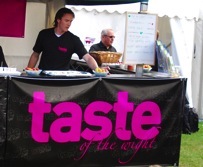
Food
What we'd like to offer in the coming years is a more localised food source for the festival, capable of supplying the majority of food needed, thus benefiting the local market and cutting down the need for excessive transport use and building up the food miles. Again, we need to start off small and build up the relationships involved, and as a result there will now be a presence, backstage this year, from Taste of the Wight, a local food collective run by Steve Blamire.
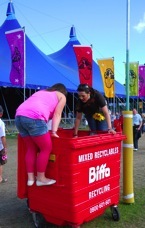
Waste and Recycling
This is a big challenge, as every event of this size will inevitably produce a large amount of waste. There are two areas which we are tackling this year. The first is to reduce the amount of waste that's generated in the first place, and, among other ideas, we are researching ways to reduce conventional packaging and use more environmentally sustainable alternatives. We are also making the festival a completely ticketless event, instead of which we are issuing secure wristbands. We are encouraging all concession and stall holders to think more about their impact and to leave as little trace as possible when they leave, and organising a recycling scheme for vegetable and cooking oil to be turned into biogas fuel.
The second is how to deal with the waste that is generated. We have installed colour coded recycling bins and made sure they are sited in the right places to facilitate easy recycling and disposal of waste. There are also ten individual bins that have been decorated by local artists, each one celebrating the theme of ten years of the IOW festival, so look out for them on the site.
We are also working closely with BIFFA, who are in charge of waste management on the Island, and, by routing most of the waste through to the new Waste to Energy Plant on the Island, which converts waste material into electricity for more than 2000 homes, we will have managed to substantially reduce the amount going to landfill this year against last year's figures.
All of the carpet used in the concession stalls and other areas will be recycled into tree mulch, there will be a test quantity of compostable tent pegs given away free on a first come first served basis, and any tents that are in one piece and left by festival-goers will be gathered up and packed down on the Monday by the local scout groups. These will then be reused.
Carbon auditing the festival
Another huge task is to try and quantify how much energy is being used, both on the site and by travel to and from the festival. We are gathering both data from previous festivals, and putting in place measures this year to gather the information which is vital to be able to properly carbon audit the event for next year. We are being helped in this by the local school, Medina High, who's Green Team will assist us by carrying out their own carbon audit on some of the visiting artists. This year's festival sees 10,000 trees being planted by the Woodland Trust to offset some of the carbon and energy used in putting the festival on, but we also feel it is important to become involved in schemes that make a difference on the Island itself. After all, the impacts, both good and bad, are felt at a local level.
Conservation Projects – Give Bees a Chance
Which leads us nicely on to this.
We are proud to announce that we have become official corporate partners with Gift to Nature, a local based organisation that manages and funds environmental projects all over the island, and there are four projects that we are supporting and helping to promote.
There are ecologically important areas of peat which are in danger of drying out, and, as peat acts as a natural carbon sink, it can release damaging greenhouse gases to the atmosphere.
The project at Alverstone helps to keep the area hydrated and so reduce the risk of this happening. It is also the site where it is hoped to re-introduce the indigenous Black Poplar tree. These trees have all but vanished from the island, and there are now only three left. But cuttings have been taken from these and are steadily growing ready to be planted along the water's edge.
English Elm trees have also been ravaged by dutch elm disease, but there has been a planting campaign of resistant trees on the Island using a type of tree called LUTECE. There are also plans to use a new tree in the future that can not only withstand the onslaught of the elm bark beetle which spread the fungus, but which also resembles the shape of the mighty English Elm. There is also a healthy population of red squirrels which has so far resisted the invasion of its grey cousins, and we intend to help with its continued isolation and therefore ecological protection.
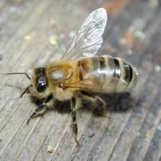
And finally, the bees.
This forms the basis of our Headline Campaign – Give Bees a Chance. There are serious problems with both populations of Bumblebees and Honeybees. The British Bumblebees have their own issues with loss of habitat directly through loss of hedgerows, and a lack of consistent food sources through monoculture and intensive agriculture. But its the honeybees that have been receiving a lot of interest recently due to an outbreak of Colony Collapse Disorder (CCD), which threatens their very existence. A virus attacks a single bee, which then returns to the hive and infects the entire colony, killing all the other bees. Although there are suggestions as to what may cause CCD, urgent research needs to be undertaken by DEFRA to understand the problem and suggest ways of combating its spread. Before it's too late.
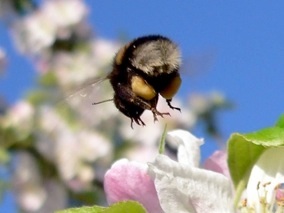
We are committed to assisting this research in any way that we can.
Contact Details:
Eco Action Partnership Ltd

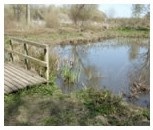


award winning green event & pr consultancy

© eco action partnership ltd 2009 Company No. 06789631
